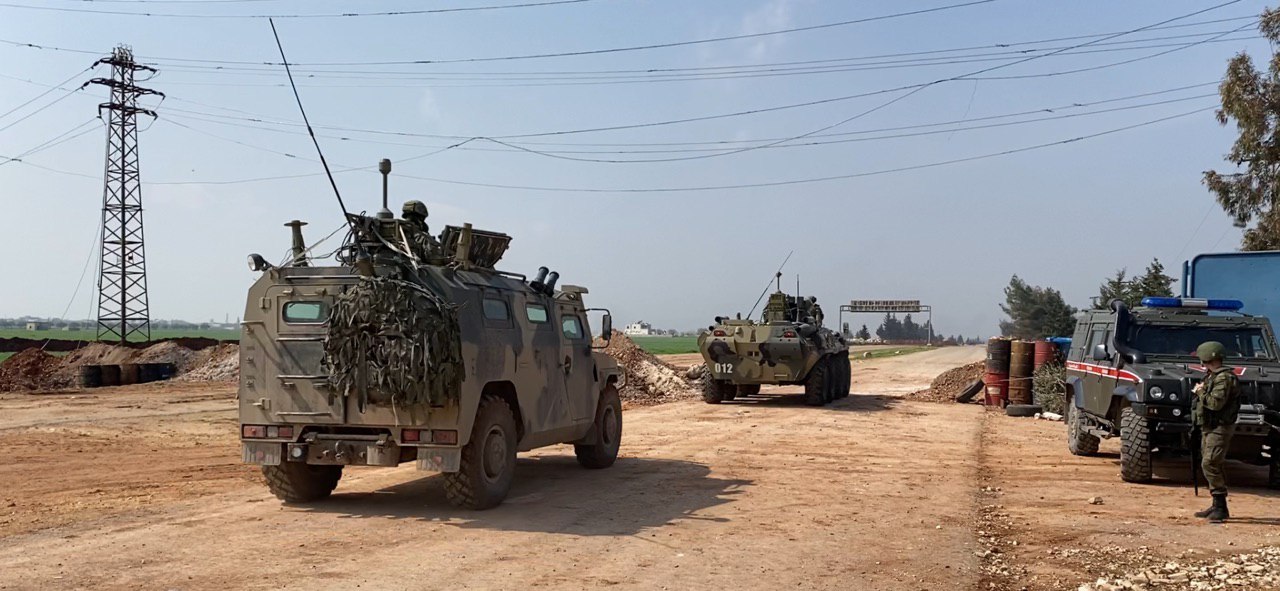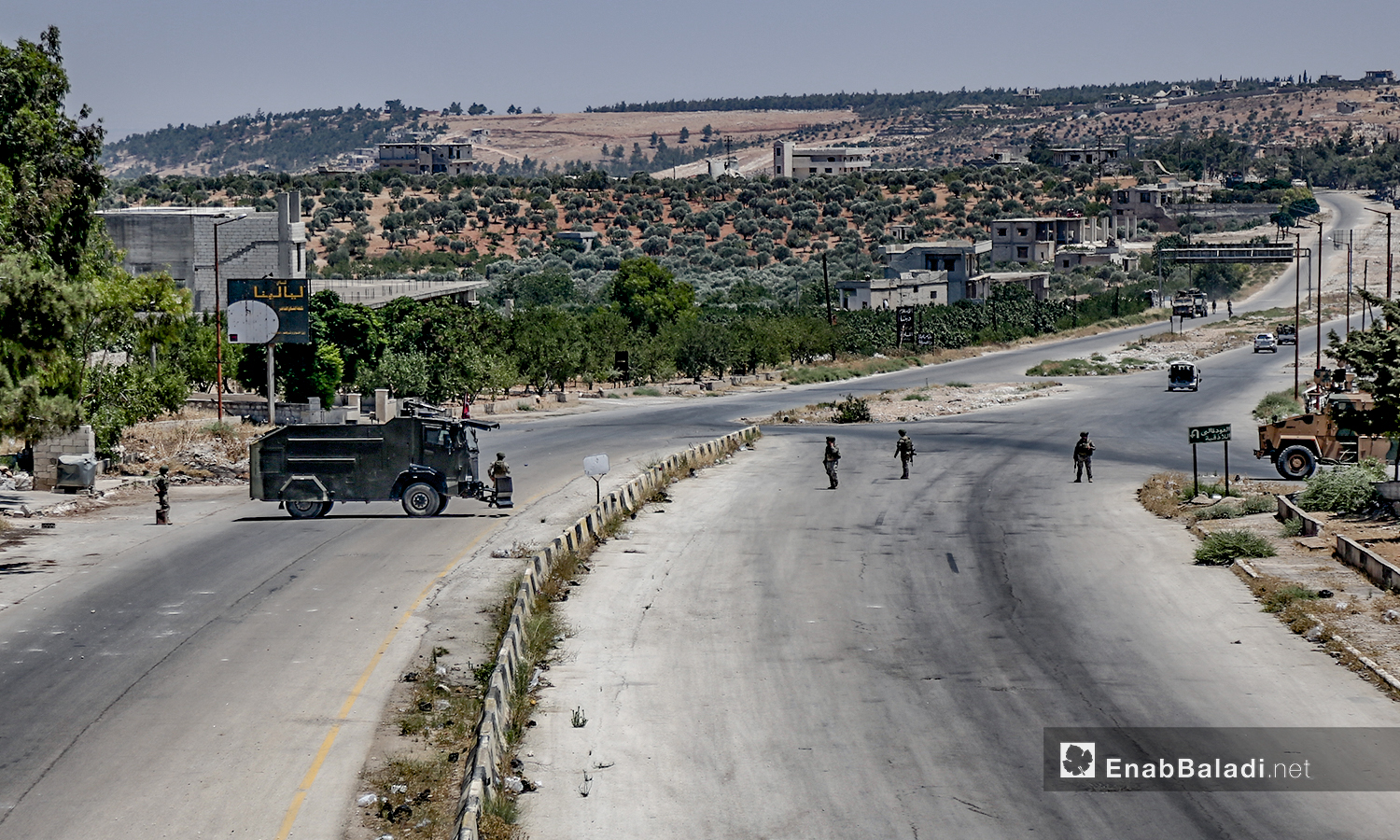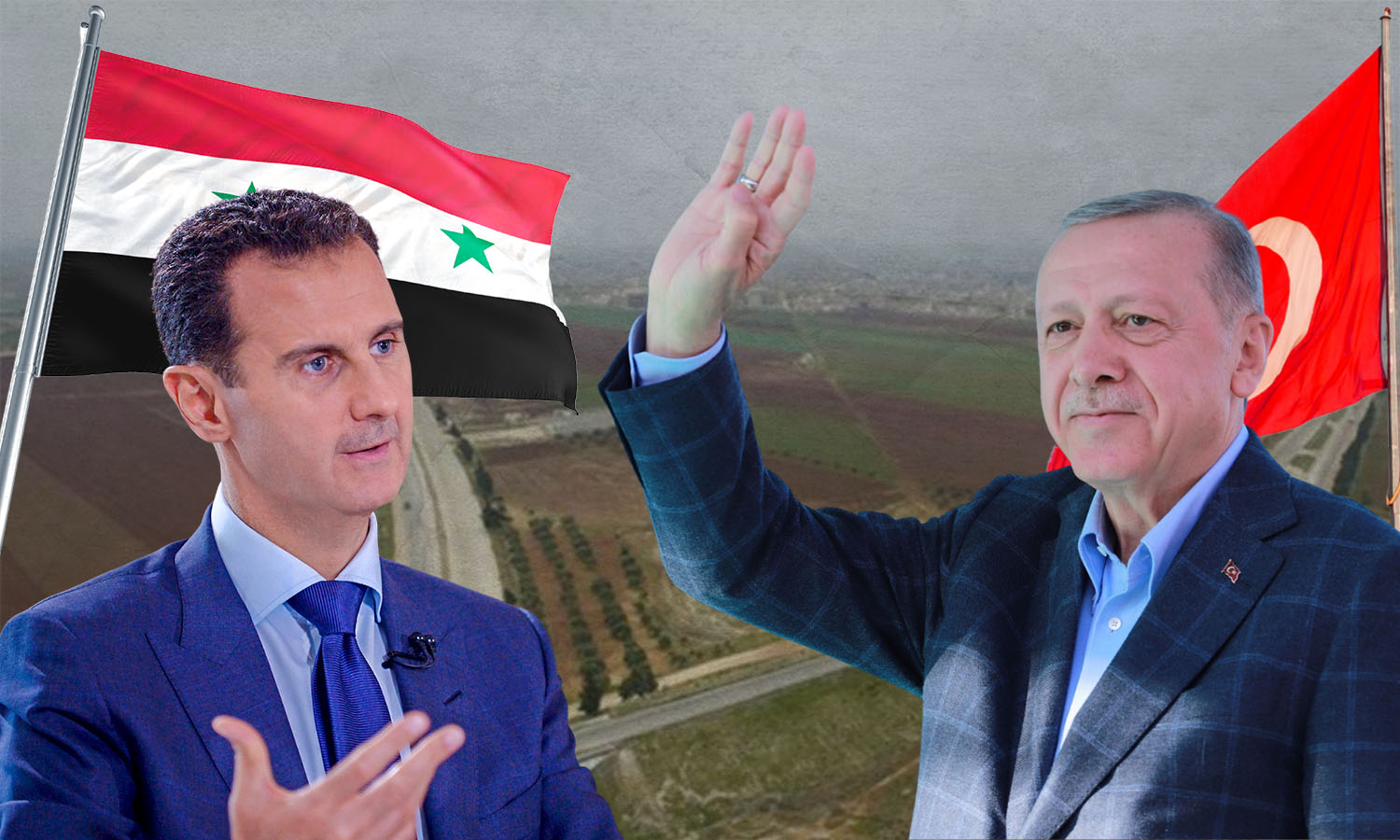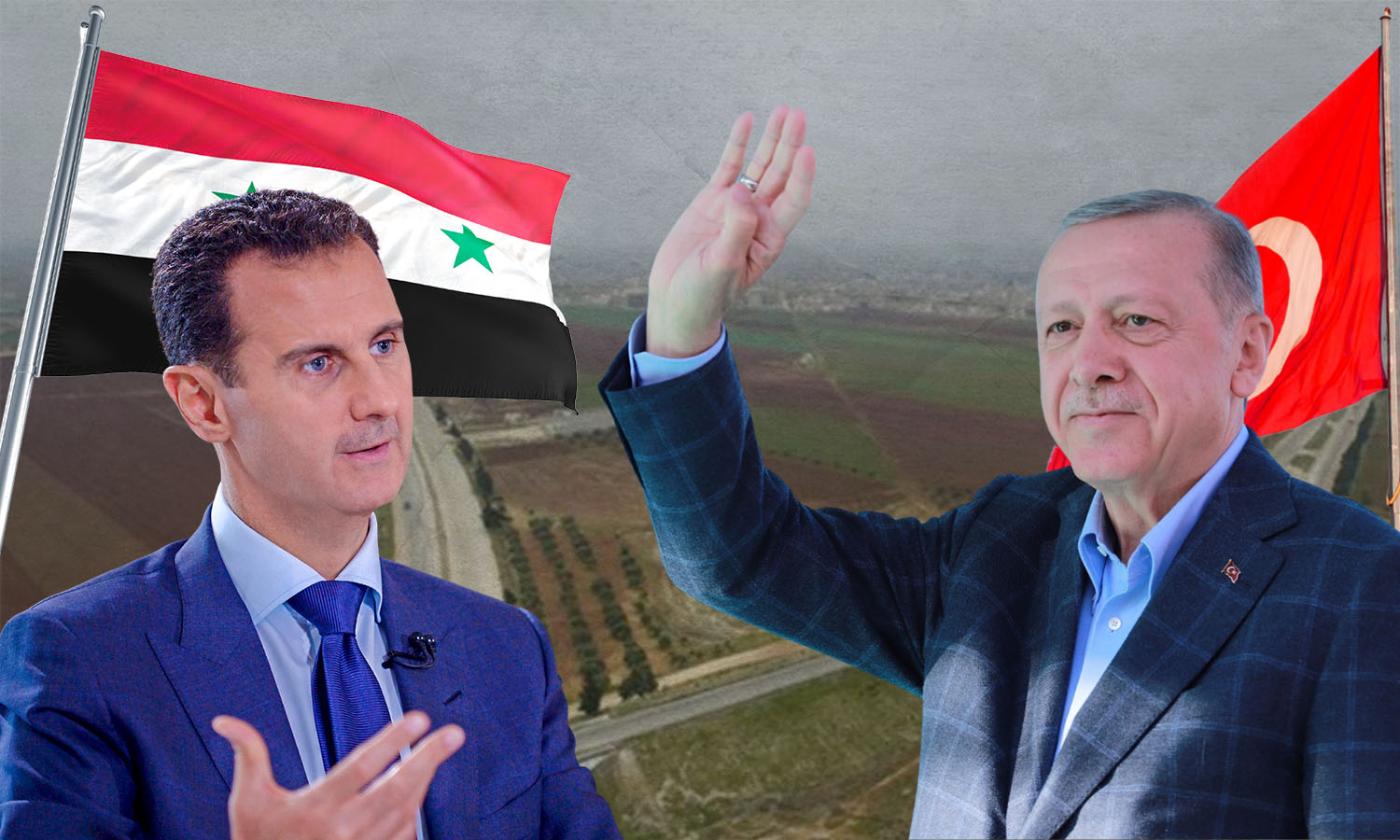Enab Baladi – Hassan Ibrahim
Changes to the map of military control in northwestern Syria have stalled since March 2020 after an agreement between Russia and Turkey demarcated a geographical border between the opposition-controlled and regime-held areas, leaving inland crossings that linked the two sides.
These inland crossings have been surrounded by recent military movements on the ground, coinciding with growing talk of a rapprochement between Turkey and the Syrian regime and understandings between international, regional, and local parties that have played key roles in the functional mechanism of said crossings.
In this file, Enab Baladi discussed with political researchers and analysts the extent to which the opening of crossings is linked to political processes, including the potential Turkish-Syrian rapprochement, and Russia’s role in pushing for opening the crossings and the economic interests resulting from the policy of securing vital lines and opening the aforementioned inland crossings.
Paving and preparing; What is happening on the ground?
The issue of opening the inland crossings has resurfaced recently after the militarily-dominant Hayat Tahrir al-Sham (HTS) in Idlib removed the earthen berms from the vicinity of the Trinbeh-Saraqib crossing in the southeastern Idlib countryside and after the Turkish-backed Syrian National Army (SNA) entered two trucks into regime-held areas through the Abu al-Zandin crossing in the eastern countryside of Aleppo.
On 24 September, HTS removed the earthen berms and fortifications from the road connecting the cities of Sarmin and Saraqib and from the perimeter of the Trinbeh-Saraqib crossing, which separates its areas of control from those of the Syrian regime, without it announcing or publishing any explanations about said removals.
Enab Baladi communicated via electronic correspondence with HTS’ media office, which only denied opening the crossing for the time being, without addressing the possibility or intention to open it soon or reporting HTS’ comment on the matter.
A military source from Jaysh al-Ahrar, operating in Idlib, explained to Enab Baladi that the pace of action was rapid to remove existing berms and mine networks without any introduction, noting that the regime forces were monitoring what was happening and that the crossing area had become exposed.
The removal of the berms at the Trinbeh-Saraqib crossing came four days after two trucks entered the Abu al-Zandayn crossing road, which connects SNA-controlled areas near the city of al-Bab, in the eastern countryside of Aleppo, to regime-held areas.
The two trucks entered regime-controlled areas under the supervision of the SNA-affiliated Sultan Murad Division led by Fahim Issa. Although activists and local sources said that they were carrying bulgur, Enab Baladi was not able to ascertain the nature of the materials carried in them.
The entry of the two trucks was followed by clashes and artillery shells fired near the crossing inside regime-held areas without knowing what had happened, followed by closing the crossing and mobilizing members of the SNA factions.

Russian military vehicles during a joint patrol with Turkey on the Aleppo-Latakia international highway – 14 March 2020 (Oleg Blokhin)
“HTS is silent” and preparing
In the absence of a comment by Hayat Tahrir al-Sham (HTS) on its intention to open the crossing, publications from media outlets close to HTS spoke of the opening of a commercial crossing between opposition-controlled areas and regime-held areas not meaning that “the revolution is over, or that it is a betrayal of the blood of martyrs, but will benefit everyone in the north, and that if there were no guaranteed benefit, this would not have been done.”
Those close to HTS also noted that commercial crossings would increase the workforce proportions in the north, it would meet the region’s needs in several areas, and the commercial crossing will not affect the reality of the “Syrian revolution on military levels.” It is not the first since the start of the revolution, as crossings were previously opened with the regime while the battles continued.
On 29 September, HTS groups attacked military points of the SNA-affiliated National Front for Liberation (NFL), its ally in the al-Fateh al-Mubeen Operations Room, due to a dispute between the two parties over the exchange of watchpoints near the Trinbeh-Saraqib crossing. This resulted in several casualties among NFL fighters.
The head of the National Front for Liberation’s media office, Saif Abu Omar, told Enab Baladi that the reason for the attack was the spread of NFL checkpoints on the Sarmin-Saraqib road, which disrupted the project to open the commercial crossing between it and Syrian regime forces.
An HTS fighter (who spoke on condition of anonymity) told Enab Baladi that an agreement was made at the level of the faction leaders in the Idlib regions, according to which the HTS elements would hand over the watch points adjacent to the Saraqib crossing, under the pretext of fortification and “land-proofing” works, without providing any information on the possibility of opening the crossing.
Opposition-held areas are linked to the regime-controlled areas through three crossings:
1- The Miznaz – Maarat al-Na’san crossing in the town of Maarat al-Na’san in the eastern countryside of Idlib.
– The crossing is closed but is used to bring in relief assistance from the United Nations under the designation “cross-line assistance” from its warehouses in regime-controlled areas.
2- The Trinbeh – Saraqib crossing in the southeastern countryside of Idlib.
Trinbeh is the last control point of the regime forces, while al-Nayrab is the first opposition-held area east of Idlib, located near the Aleppo – Latakia international highway (M4).
3-The Abu al-Zandin crossing, east of the city of al-Bab in the eastern countryside of Aleppo.
It is considered a commercial and humanitarian crossing that separates SNA-held areas from regime-controlled areas. Through it, several prisoner exchange operations were conducted between the Syrian National Army (SNA) and the regime forces, under Turkish-Russian auspices and under the supervision of the United Nations and the International Red Cross.

Conducting a Turkish – Russian patrol on the M4 highway in Idlib – 14 July 2020 (Enab Baladi / Youssef Ghuraibi)
Doubletalk; trial balloon?
A Telegram account active since 17 April 2020, bearing the name Saraqib Commercial Crossing and is concerned with the movement and operation of the crossing, said that preparations are continuing to open the road and open a commercial crossing between the two areas “that ensures the safety of the liberated areas and lower prices,” citing several reasons for opening it:
- Stimulating the economy and increasing the commercial movement.
- Improving the living conditions of workers and small business owners.
- Contributing to increasing farmers’ profits so they would be able to cultivate their lands in the next season.
- Urging traders and owners of medium and large projects to increase their commercial activity and import goods from abroad.
- Reducing “illegal” smuggling operations and preventing their spread.
- Facilitating the lives of the people in regime-held areas during worsening economic conditions and in light of the regime’s neglect of them.
- Bringing medicines and medical supplies from regime-controlled areas to the northern areas to help the sick and wounded.
Through several posts, the Saraqib Commercial Crossing account stated that the Syrian Salvation Government (SSG), the political umbrella of Hayat Tahrir al-Sham (HTS), decided to open the crossing, pointing out that the crossing administration agreed with SSG to secure the road from one faction for fear of problems or obstacles to the future operation of the crossing, and that the preparations for its opening are still ongoing.
The Director of SSG’s Public Relations Office, Mohammad al-Asmar, denied to Enab Baladi the validity of the administration of the Saraqib crossing’s statement, stating that SSG had nothing to do with the issue of opening the crossing, nor does it even have information about it.
What was reported on the Saraqib Commercial Crossing account was met with wide interaction and circulation on a large scale in northern Syria, offset by a lack of denial or confirmation by HTS or even by its auxiliary media of military correspondents and activists.
Enab Baladi reached out to HTS’ media office to inquire about the veracity of what the account had reported regarding its processing and HTS’ supervision of its opening, but it did not receive any response until the moment this report was published.
Turkish movements on the ground
The pace of Turkish military convoys entering the Idlib areas and the number of military positions in the Idlib countryside increased, amounting to about 74 positions, and their number increased from 22 to 23 positions in Jabal al-Zawiya. There were some Turkish movements in northern Syria over the past two months, particularly in HTS-held areas.
Although the entry of Turkish convoys is periodic, routine, and customary in Idlib areas, it has recently increased in conjunction with local talk of upcoming understandings in the regions, especially with the establishment of a new Turkish point in a strategic area near the village of San in Saraqib on 31 July.
The most recent of these convoys was on 29 September, when a Turkish military convoy that carried tanks and heavy machinery had entered the Bab al-Hawa border crossing with Turkey and headed to Turkish forces’ points in the southern countryside of Idlib. It was preceded by another convoy on 13 August, which included about 25 heavy machinery.
On 19 July, a Turkish military official met with council chairpersons and representatives of Jabal al-Zawiya villages at the Turkish point in the town of Balion, south of Idlib.
The khatib and imam of the Great Mosque of Balion, and one of the attendees of the meeting, Musa al-Sheikh, told Enab Baladi at the time the Turkish side made promises that, in the event that displaced people from Jabal al-Zawiya (which is bombed by the regime and Russia on an almost daily basis) would return to their homes, services will be provided to the entire region and the destroyed houses would be restored with assurances that there would not be any hostilities or dangers that might threaten them.
A Turkish officer had also spoken about the possibility of opening crossings with the Syrian regime, al-Sheikh said.

Conducting a Turkish-Russian patrol on the M4 international highway in Idlib region – 14 July 2020 (Enab Baladi / Youssef Ghuraibi)
A step towards a Turkish rapprochement with the Syrian regime?
The movements near the internal crossings, which took place under the supervision of the opposition factions, came after bickering and statements by Turkish officials about Turkey’s rapprochement with the Syrian regime.
On 11 August, the Turkish Foreign Minister, Mevlut Cvusoglu, revealed a “short” conversation he had with Syrian Foreign Minister Faisal Mekdad on the sidelines of the Non-Aligned Movement meeting held in October 2021 in the Serbian capital, Belgrade.
Cavusoglu stressed at the time the need to reach “reconciliation” between the opposition and the Syrian regime, considering that there will be no “lasting peace without achieving this.”
On 15 September, Reuters reported that the head of Turkey’s intelligence agency, Hakan Fidan, met with the director of the Syrian regime’s National Security Office, Ali Mamlouk, in the Syrian capital, Damascus, according to a “regional source loyal to Damascus.”
Hassan al-Nifi, researcher and political analyst, told Enab Baladi that opening the crossings between the opposition-controlled and regime-held areas is essentially a demand that Russia has constantly been pushing for, and it is the result of a Turkish-Russian agreement and understanding, two years ago.
Al-Nifi believes that the issue has been renewed recently due to two issues. The first is that the Turkish political climate is appropriate for paving the way for such a step, noting that talking about a rapprochement between Turkey and the regime of Bashar al-Assad may give the rest of the factions that have a solution and linkage on the ground an opportunity to open these outlets.
The researcher believes that the second issue of opening the crossings is the economic aspect, which is the most important, pointing out that the accounts of the opposition factions are not purely political but are primarily financial. The crossings bring in huge profits.
The talk of rapprochement is still present, despite the Turkish presidential spokesman Ibrahim Kalin denying the existence of any plan to normalize relations between the two sides on 24 September.
During this period, statements from both parties surfaced, the most prominent of which was the statement of Turkish President Recep Tayyip Erdogan on 19 August, who said that Turkey’s concern is not “defeating al-Assad,” but instead reaching a political solution and reaching an agreement between the opposition and the regime.
For his part, Taha Ouda Oğlu, a researcher in Turkish affairs and international relations, believes that the resumption of talk about opening the crossings at this time coincided with the disclosure of meetings that took place during the past weeks between the Turkish intelligence services and the Syrian regime.
It seems clear that these meetings have yielded results, foremost of which is the preparation of the crossings to open their doors soon after years of closure, Ouda Oğlu told Enab Baladi.
Dr. Abdul Rahman al-Haj, a Syrian researcher covering religious movements, told Enab Baladi that it is difficult to be certain that opening the crossing came at a Turkish request, even indirectly, because progress in the dialogue between Turkey and the Syrian regime is still far from reaching the implementation of understandings of this type.
Al-Haj attributed the reasons for the return of the crossing issue to being economic rather than political reasons, ruling out that it is related to a Turkish request or that it is part of the countries’ understanding with the regime.
What about the post-crossing stage?
Amidst the ambiguity of the scene, and the tensions, whether political or military on the ground, between parties whose interests converged in files and conflicted in others, speculation abounded about the next stage in the event of opening the crossings and its impact on the political track.
Taha Ouda Oğlu, a researcher in Turkish affairs and international relations, believes that if this step (opening the crossings) takes place, it will speed up the process of normalizing Turkish-Syrian ties with the regime during the next stage.
Ouda Oğlu said that all these developments are a clear indication that the two countries are on the verge of fundamental changes in the map of the Syrian conflict and in the face of a Syrian-Turkish opening of relations soon, suggesting that there will be new developments in the course of normalization between the two countries in the last months of this year.
For his part, researcher and political analyst Hassan al-Nifi believes that opening the crossings from a political point of view will not have positive repercussions on the Syrian cause and revolution and will open economic and commercial windows for the Syrian regime with the northern regions, which creates fears that the regime will exploit this step for its own benefit before the international community by claiming to have opened channels with opposition areas.
The political analyst considers that this step (opening the crossings) comes to take advantage of the political climate between the al-Assad regime and Turkey and to talk about normalization, as this atmosphere is considered appropriate to open the crossings for those who had the prior intention and desire to do so.
Al-Nifi does not rule out that the Syrian regime will use these outlets, not for economic benefit, but to pass on other matters and things that may have many negative repercussions on the Syrian issue and on the people in northern Syria.
Where does Russia stand?
Russia has played a major role in most of the Syrian files on several levels since it stood by the regime and intervened militarily and politically for seven years, especially in the issue of the internal crossings, as the “Moscow” agreement or the “ceasefire” constituted the cornerstone of any talk regarding these crossings, despite not complying with its terms several times.
Several attempts to conduct and deploy Russian-Turkish patrols along the Aleppo-Latakia international highway (M4) near the crossings and contact lines failed despite it being one of the terms of the agreement between Russia and Turkey on 5 March 2020, after a sit-in of civilians on the road to prevent their passage, and the patrols were targeted by unknown persons and factions that adopted some operations.
Turkey conducted some patrols without any vehicles for Russia, which refrained from participating under the pretext of “the inability of the Turks to protect the road” after several joint patrols that were punctuated by targeting that exposed them to damage and halt and caused casualties between the Turks and the Russians.
Anton Mardasov, a Russian analyst and a non-resident scholar in MEI’s Syria Program, told Enab Baladi that Moscow will consider commercial contacts, if they occur between the regime and the opposition through these crossings, as a positive sign for finding internal Syrian reconciliation.
Mardasov added that many Russian diplomats are aware that the regime’s propaganda about “terrorists” is incorrect and that there are families living in regime-controlled areas today who want to visit their relatives in an opposition-controlled area in the future.
Opening the crossings does not mean that Moscow will not launch strikes on Idlib because, in this way, Russia maintains a certain degree of tension and shows itself to the world as an important player who is still in Syria despite the “collapse” in Ukraine, according to Mardasov.
The ceasefire clause in the “de-escalation” area in Idlib was subjected to numerous violations, manifested in almost daily shelling by the regime forces and Russia, and with varying frequency of Russian raids, which resulted in the loss of life and property damage.
The “Moscow” agreement signed on 5 March 2020 between Russian President Vladimir Putin and his Turkish counterpart, Recep Tayyip Erdogan, stipulates the following:
– A ceasefire at 00:01 local time on Friday (22:01 GMT on 6 March) along the front line between the regime and the opposition.
– Establishing a security corridor six kilometers north and six kilometers south of the main Idlib international highway (M4), which is the road that connects the Syrian regime-controlled cities in Aleppo and Latakia.
– Deploying joint Russian-Turkish patrols along the M4 road, starting from 15 March of the same year.
For its part, the Syrian regime did not address the issue of opening the internal crossings officially, and the discussion was limited to what was published by the pro-governmental al-Watan newspaper, which quoted what it called “sources close to the Turkish government” that the Russian mediator’s intervention is keen to make the negotiations a success with solutions satisfactory to both the Turkish and Syrian parties, in order to achieve more rapprochement between the two countries.
The newspaper said that the course of the Syrian-Turkish security negotiations, although thorny and fraught with obstacles, may succeed, through the “step-by-step” policy, in overcoming some of the difficulties facing the convergence of views on the issues raised on the table of intelligence research.
It pointed out that “complete consensus” is not currently required and that the hoped-for “road map” as a result of the security and military talks needs great efforts by both parties and requires intensifying meetings between them.
The sources considered that the Syrian regime had allowed the people of Maarat al-Numan, and perhaps Saraqib later, who were displaced in opposition-held areas and from outside the country, to return to their areas, after the opening of a “reconciliation” center in the city of Khan Sheikhoun in the southern countryside of Idlib, on 7 September 2021, as a goodwill gesture from the Syrian regime in exchange for Erdogan directing the opposition factions to reopen three internal crossings.

Local protesters on the Aleppo-Latakia M4 international highway, protesting against the Russian forces who began to patrol on the strategic road – 15 March 2020 (Enab Baladi)
Economic vent or a new risk?
Some activists and residents believe that opening the crossings will constitute an economic outlet for the region, while others consider it a gateway to the spread of drug trade in opposition-controlled areas and its security penetration, and some of them consider that opening the crossings is “a betrayal of the blood of the martyrs.”
The researcher in political economy, Yahya al-Sayed Omar, told Enab Baladi that the issue of opening the crossings has economic and political dimensions, even if the political is superior to the economic.
“The opening of the crossings can be considered a real indicator of the nature of the relationship between Turkey and the Syrian regime. If the crossings have already been opened, this is an indication of the progress of security coordination between the two parties and vice versa. If this stops, it means that real progress cannot be made,” he said.
The crossings are considered a positive case and serve everyone, but in the Syrian case, these crossings are a special case since the benefit may be in the interest of the Syrian regime in return for its retreat in the interest of the opposition or civilians on both sides of the crossing, the researcher adds.
Al-Sayed Omar believes that opening the crossings will not often cause an increase in smuggling, as it is mainly present and does not depend on the crossings, but the real danger is that it will be a gateway to security breaches in the region and that it will be used to market some of the regime’s stagnant products, especially some vegetables and fruits, which may cause dumping of the market, and consequently a loss for the farmers of the region.
|
The crossings are generally a positive case, provided they are used for the benefit of all and not to serve the regime and some opposition factions, with no real benefit to the local population. Researcher in political economy Yahya al-Sayed Omar |
While the Syrian researcher specializing in religious movements, Dr. Abdul Rahman al-Haj, pointed out that the crossings provide goods at a much lower price than those coming from Turkey and that Turkish goods that can go to the regime’s areas from crossings in the areas controlled by Hayat Tahrir al-Sham In Idlib (Saraqib, Trinbeh and Miznaz, Maarat al-Na’san), will lead to financial returns for the HTS.
Al-Haj warned of the danger coming from opening the crossings, which is the regime’s flooding of the northern regions and Turkey with drugs, as it did with Jordan.
The opening of the internal crossings is still hostage to consensus between many parties, political and military, in addition to the popular incubator of residents and activists, as they expressed their refusal to open them through demonstrations and sit-ins, which included burning tires and standing in the way of joint patrols and fighters of the opposition factions.
if you think the article contain wrong information or you have additional details Send Correction
النسخة العربية من المقال
-
Follow us :













 Head of the Syrian regime Bashar al-Assad and Turkish President Recep Tayyip Erdogan (edited by Enab Baladi)
Head of the Syrian regime Bashar al-Assad and Turkish President Recep Tayyip Erdogan (edited by Enab Baladi)





 A
A
A
A
A
A








 More In-Depth
More In-Depth